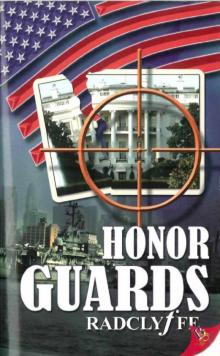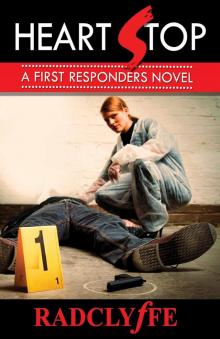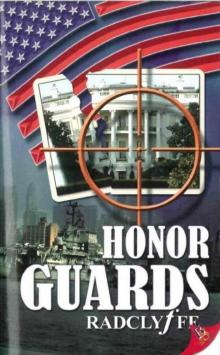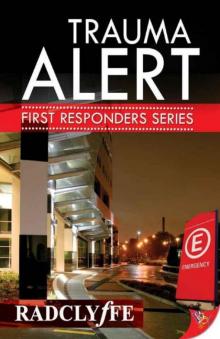Against Doctor's Orders Read online
Page 7
Walking to the stairwell, she ran the list of patients in her head. Plenty of time to see them all before meeting Presley. She’d learned a few things about Presley Worth the night before. At least what Presley Worth chose to show the world. Thirty years old, only daughter of Yolanda and Martin Worth, twin of Preston. MBA from Wharton at twenty-three. VP of Operations at SunView at twenty-six. Brother Preston’s title was loftier—Chief Financial Officer—but organizationally apparently equivalent to Presley’s. Twins, still. Father was CEO, mother COO. High-powered, influential family. Presley had never married, supported humanitarian causes, and appeared to have no personal life beyond attending the obligatory charitable and business functions. What she did have was a record of successfully spearheading much of the expansion of SunView Health Systems from a regional Southwest healthcare network into a transcontinental consortium of hospitals, short- and long-term-care facilities, and allied enterprises. Harper hadn’t been able to find out much more than that, but she wasn’t done digging yet. If SunView was to be her new employer, she wanted to know who—or, more accurately, what—it was all about.
On impulse, she bypassed the stairs and turned down the east corridor toward admin, wondering if her father might be in the staff office catching up on paperwork as he often did early in the morning. His door was partly open and the light on, and she started in, expecting to hear his voice as he dictated reports or discharge summaries. She drew up short, remembering too late the office wasn’t his any longer.
“If you’re sure you can find it, call me when you get settled,” Presley said. “I’ll show you around and get you started on the staff assessments…About what you might expect. An abundance of dinosaurs.”
Harper halted, unable not to hear the conversation.
Presley laughed. “Around here, putting out to pasture is more than a metaphor…See you soon.”
Harper knocked on the door, refusing to skulk away as if she’d intentionally been eavesdropping. She wasn’t surprised by Presley’s view of the Rivers as provincial and old-fashioned, considering the circles she usually moved in, but the snap judgment irked all the same. Traditional didn’t mean outdated.
“Come in,” Presley called.
Harper pushed the door wide and Presley rose behind her desk. She glanced at her watch when she saw Harper.
“I’m sorry, am I late? I thought you said—”
“No, I just happened to be here.”
Presley wore another understatedly elegant suit, a pale green shirt over rich chocolate trousers. The jacket hung over the back of what had been Harper’s father’s chair. Her golden-blond hair was held back with a paler gold tie. She looked crisp and efficient and commanding. She should have looked out of place, but somehow she didn’t. She wore authority well, and that confidence was compelling. Harper slid her hands into the pockets of her slightly rumpled khakis. Presley was studying her in turn. Her gaze, acute and unapologetic, traveled over Harper’s face. Harper wondered what she was looking for, and what she saw.
“Do you do this often?” Harper asked.
Presley leaned forward, her fingertips resting on the surface of the desk, her gaze holding Harper’s. “What, exactly?”
“Take over hospitals?”
“We acquire new facilities several times a year,” Presley said.
“And then what do you do with them?”
“I plan to provide a prospectus of SunView’s activities that I think will give you a better understanding of who we are.” She frowned slightly. “I’m afraid the lines of communication haven’t been handled as well as they should have been regarding this acquisition. I wasn’t in charge of the initial negotiations. So I apologize for the lack of information. I plan to rectify that as soon as possible.”
“If you weren’t in charge, who was?”
“Another department,” Presley said coolly.
“So why apologize?”
“Because I’m here now, and I am in charge.”
Harper appreciated Presley’s refusal to pass the buck, whether out of loyalty or sense of responsibility. Both counted in her book. “I understand. It’s sort of like here.”
“I’m sorry?”
Harper grinned wryly. “The board kept this quiet until the deal was done.”
“I can assure you, Dr. Rivers—”
“Harper.”
Presley nodded. “Harper. None of this was undertaken with the intention of secrecy. SunView dealt with those who controlled the financial—”
“So I was told. But there’s more to us than facts and figures, you know.”
“I know,” Presley said.
“Do you?”
“I will.”
Harper knew the heart of the Rivers wasn’t going to be found in the ledgers and balance sheets, and she wanted this woman, this stranger who seemed to hold the fate of a big part of the community in her hands, to know that too. “Let’s postpone the tour. Make rounds with me this morning instead. Get a look at what the hospital is really like out from behind that desk.”
Presley’s first instinct was to refuse. She had just started delving into the financials and had the entire day planned out. Carrie was on her way to the house from the airport and ought to be at the hospital by midmorning. She didn’t really have time for anything other than a quick survey of the physical layout. And what could she possibly learn from trailing after Harper while she visited patients?
“Don’t you think the patients would find that an intrusion?”
“If there’s anything sensitive, we’ll ask their permission. But I doubt it.”
“I really don’t have—”
“How can you run a healthcare system and not know what it is that we really do?”
Presley stifled her irritation. The question just underscored how little she and Harper had in common. One didn’t need to know how an airplane engine worked to run Boeing, or understand nanomaterials to manage IBM. That was what the technical departments were for. “Running a hospital profitably occurs on a different plane than dispensing care. I wouldn’t be surprised if you were happy accepting chickens in payment for your services, but most of us have moved beyond that now.”
“Right. Because I’m one of the dinosaurs.”
“Ah.” Presley glanced at the open door. No one had been around when she’d arrived before dawn, and she’d been careless. She wouldn’t let that happen again. There was no point apologizing, not that she was inclined to. Her assessment of the staff, no matter how flip, was also accurate. The physicians with admitting privileges were an aging group with the exception of a handful like Harper and Flannery. Most were well beyond retirement age and, she was willing to bet when she looked at their statistics, probably had a preponderance of elderly patients with few resources who overstayed the recommended average, putting a strain on the hospital’s resources and lowering the reimbursement quotient.
“I wasn’t actually thinking of you with that remark.”
Harper shrugged. “I have been known to take a dozen eggs now and then.”
Presley laughed. “I completely believe that.”
“You can be pretty sure I mean what I say.”
“I suspect that’s a family trait.”
“Among others.”
Presley put her laptop to sleep. Transitions always went more smoothly when the hospital’s power brokers were cooperative. Harper Rivers—the whole Rivers family—was enmeshed with the hospital and the community. Antagonizing any of them was not prudent. If spending an hour tagging along with Harper would help, she’d make room in her schedule.
She slipped into her jacket and slid her cell phone into her pocket. “All right, Dr. Rivers. Educate me.”
*
Harper hadn’t expected Presley to agree. She’d seen the indecision in her eyes and could almost read the dismissal in her mind. Hiding her surprise when Presley joined her, she led the way back to the main hospital building, pointing out the administrative offices as they passed.
&nb
sp; “The head of admissions is over here,” Harper said, pointing to the door to her sister’s office. “Carson should be in around eight. She can tell you just about anything you need to know about hospital visits, admission stats, placement, that sort of thing. She deals with social services pretty regularly as well.”
“That would be”—Presley scanned her mental files—“Carson Rivers.”
“That’s right.”
“Let me guess.” Presley paused. “Sister?”
“Third oldest, right.”
“Wait a minute.” Presley smiled, warmth softening the usually cool planes of her face. “Harper, Flannery, Carson. Who in the family is the Southern-author fan?”
“They’re some of my mother’s favorites,” Harper said. “She and my father met when he was doing his residency in Charlotte. She said if she had to move north into Yankee territory, her children would be reminded of their Southern roots.”
“Harper,” Presley turned the word over musingly. “It’s Harper Lee, isn’t it? Harper Lee Rivers?”
Harper nodded.
“Flannery O’Connor Rivers?”
Harper grinned. “That’s right.”
“Carson McCullers Rivers?”
“Right again.”
Presley laughed, and her laughter transformed her. She was still elegant, but softer, more approachable, the light dancing in her blue eyes hinting at hidden humor. “Tell me, is there a Kate Chopin Rivers too?”
The punch to the heart was no less powerful for being familiar. Harper kept her smile in place. “Kate was the fourth.”
Presley’s laughter disappeared and gentle sympathy filled her gaze. “I’m sorry.”
“Yeah. Me too.”
“Are there others?”
“Margaret Mitchell, the youngest. Margie is fifteen.”
“No boys?”
“I guess my mother wasn’t as fond of the Southern male authors.”
“Hmm. Is Margie bound for medicine too?”
Harper laughed. “She swears she’s forgoing medicine for professional soccer.”
“Breaking the family mold.”
“We’ll see. I went through a period when I was planning on being an organic farmer.”
“You, a farmer?” Presley shook her head. “I can’t see it.”
“I grew up on a farm, although I didn’t do a whole lot of hands-on farming. I was too busy following my dad around. But we’ve got some cows, chickens, a few pigs, and plenty of fertile pastureland. One of our neighbors farms that for us.”
“Never thought about leaving?”
“I left for medical school and residency.” Harper pushed open the stairwell door and held it for Presley. “And I was ready to come back. Not enough time to think. Too much noise.”
“Noise?”
“In the city. Always something moving, always something changing. Always something making noise.”
“Most people think of that as progress. And exciting.”
“I don’t see why progress has to be noisy.” Harper opened another door. “This is the fifth floor—the top floor. A mixed population of med-surg patients who no longer require acute nursing supervision. Most of the patients up here will be ready for discharge in a few days.”
“How many beds?”
“Eight rooms a side, two beds each on this floor. We’re about half-full up here right now.”
While Harper went to the supply room to get what she needed for rounds, Presley looked over the physical facilities, taking note of the number of nurses, aides, clerks, and other personnel. The staffing seemed adequate, but not excessive. The hospital was obviously old, but in good repair. The walls were freshly painted a neutral eggshell, the floors practical industrial tiles in a complementary tan. When she glanced into one of the patient rooms, she saw two large windows overlooking a grassy lawn. Pleasant. Peaceful.
Harper guided her down the hall. “The patient we’re about to see is ready to go home. Euella Andrews. She had a stroke about a year ago and has been managing at home with her daughter’s help. Unfortunately, she fell several weeks ago and suffered a hairline fracture to her femur. Flann decided not to operate and put her in traction. She started—”
“Your sister’s a general surgeon, isn’t she?”
“That’s right, with a trauma certification. She’s qualified to handle straightforward orthopedic problems, and the consulting orthopedists are just as happy for her to do it. Saves them getting out of bed at night to put on casts or review X-rays.”
“What happens if you have a complicated orthopedic problem—open fractures, joint replacements, that sort of thing?”
“Then we’ll refer or transfer.”
“Orthopedic procedures reimburse well, but the rehab can be costly,” Presley said. “Not a bad compromise.”
“Our thinking was it made sense to treat what we could—keeps the patients closer to home and our staff busy.”
“There, you see? We can find common ground.”
“Good to know.”
From there, they worked their way down through the wards, checking patients, ordering tests, charting progress. The patients greeted Harper as if Harper held the key to all the mysteries of life. She was relaxed and conversant with the patients, good-naturedly answering their questions and reviewing the treatment plan when they were ready to go home, chiding some of them to follow instructions. She introduced Presley as one of the hospital managers, and that seemed to be all that was necessary for her to be accepted. If the same thing had happened in Phoenix, the risk management team would probably have had people sign consent forms before they even let her into a room. Here, all it took was Harper’s introduction. She could see how that kind of freedom would appeal, especially to someone like Harper for whom the hospital was like a second home. Unfortunately, the days of medical fiefdoms were long over. Everyone from the state to the insurance companies wanted a say, and part of her job was seeing that the hospital and everyone in it stayed on the right side of the line. Breaches in regulations were costly.
As Harper was finishing a note, the phone rang at the nurses’ station. A male clerk who looked all of fifteen answered, listened, and held the phone out to Harper. “Page operator for you, Harp.”
“How do they know where you are?” Presley asked.
Harper laughed. “They always know.” She took the phone. “Harper. Okay, tell them I’ll be down in fifteen.” She passed the phone back, racked the chart, and motioned to Presley. “ER consult. Let’s grab a cup of coffee on the way.”
Presley snuck a peek at her watch, surprised to see how much time had passed. Usually when she was forced into social situations, she was bored senseless before the hors d’oeuvres were finished. This had been unexpectedly engaging. Harper was warm and compassionate while being thoroughly professional and effortlessly in command. The patients obviously loved her. “I suppose I can spare a few more minutes. Coffee sounds delightful. I’m buying.”
“You’re on.”
They took the stairs to the first floor, since Harper apparently did not believe in using the elevators. After pouring a large cup of dark coffee from a stainless steel urn, Presley grabbed a doughnut on the way to the checkout counter. Harper introduced her to Luanne, the cashier, who gave her a long inquiring stare. Luanne looked to be in her early twenties, full-bodied, with bottle-blond hair and sharp, appraising eyes. She turned slightly, a subtle redirection of her attention to Harper.
“Haven’t seen you out to Elmer’s the Hilltop lately, Harper.”
“Been pretty busy.”
“A little relaxing will do you good, don’t forget.”
Harper took Presley’s change and picked up their tray. “I’ll keep that in mind.”
Presley slid into a seat at the dining table next to Harper and reached for her powdered-sugar doughnut. “I imagine you know everyone here.”
Harper sipped her coffee. “Pretty much. One way or the other.”
“Ah, yes.”
Har
per laughed. “Not that way.”
“I can see where that might be problematic. Hospitals aren’t known for privacy.”
“That might be the first understatement you’ve made.”
“Still, I imagine after a while no one has any secrets.” The idea disturbed her. She much preferred the seclusion of her offices, where she knew what to expect and could decide how much to reveal.
“You might be surprised by the place.”
“You might be right.” Already, Presley’s normal routine had been upended. After all, she was sitting in the cafeteria in the middle of the morning with a woman she had nothing in common with, enjoying herself.
Chapter Eight
“So tell me,” Harper said, leaning back in her chair at the cafeteria table, “what do you need to know from the medical staff?”
Presley hesitated. She rarely interfaced personally with the staff at institutions SunView acquired, her decisions being several levels removed from the employees. Somehow she’d already broken her pattern at ACH and wanted to extricate herself diplomatically. She would far prefer the occasional smile from Harper than the barely disguised suspicion. “Well, I’ve just started and—”
Dr. Rivers, STAT, ER. Harper Rivers, STAT, ER.
“Come on.” Harper shoved her chair back and took off at a jog.
Presley automatically followed, whispering a silent thanks she’d worn low heels she could actually manage to run in that morning. Dimly aware of people hurriedly stepping aside, she focused on Harper as they sprinted through doorways, down hallways crowded with staff and patients, and around corners. Finally she recognized the entrance to the emergency room. Harper slapped an oversized red button on the wall and the big metal doors swung inward. Harper, steadying the stethoscope draped around her neck down against her chest with one hand, raced through without breaking stride. Presley ducked in as the doors closed, vowing to take up jogging as she struggled to catch her breath.
“What have you got?” Harper called to no one in particular.
A woman wearing a Snoopy smock pushed aside a curtain and leaned out into the hall. “Down here.”

 Secrets of the Heart
Secrets of the Heart Clinical Trials
Clinical Trials Blessed Benediction
Blessed Benediction Happy, Happy Birthday, Baby
Happy, Happy Birthday, Baby Cost of Honor
Cost of Honor Love on the Night Shift
Love on the Night Shift Top of the Class & Bonus Night
Top of the Class & Bonus Night You Don’t Bring Me Flowers
You Don’t Bring Me Flowers When Dreams Tremble
When Dreams Tremble Firestorm
Firestorm The Color of Love
The Color of Love Women of the Dark Streets
Women of the Dark Streets Radclyffe - (Honor 4) - Honor Guards
Radclyffe - (Honor 4) - Honor Guards Honor 03 - Love And Honor
Honor 03 - Love And Honor Love's Masquerade
Love's Masquerade Love After Hours
Love After Hours OMGQueer
OMGQueer A Matter of Trust
A Matter of Trust Honor Under Siege
Honor Under Siege Best Lesbian Romance 2009
Best Lesbian Romance 2009 Honor 06 - Honor Under Siege
Honor 06 - Honor Under Siege Best Lesbian Romance 2012
Best Lesbian Romance 2012 Breathless
Breathless Nick of Time
Nick of Time The Lonely Hearts Club
The Lonely Hearts Club Price of Honor
Price of Honor Word of Honor fr-7
Word of Honor fr-7 Winds of Fortune (Provincetown Tales Book 5)
Winds of Fortune (Provincetown Tales Book 5) Above All, Honor
Above All, Honor Radclyffe - Honor 06 - Honor Under Siege
Radclyffe - Honor 06 - Honor Under Siege Distant Shores, Silent Thunder
Distant Shores, Silent Thunder Word of Honor
Word of Honor Word Play
Word Play Fated Love
Fated Love Homestead
Homestead Radical Encounters
Radical Encounters Heart Stop
Heart Stop Code of Honor
Code of Honor Myth and Magic
Myth and Magic Wild Shores
Wild Shores Oath of Honor
Oath of Honor Desire by Starlight
Desire by Starlight Love Burns Bright
Love Burns Bright Promising Hearts
Promising Hearts Helplessly Hers
Helplessly Hers Love & Honor h-3
Love & Honor h-3 All About Us
All About Us Honor 01 - Above All Honor
Honor 01 - Above All Honor Honor 05 - Honor Reclaimed
Honor 05 - Honor Reclaimed Innocent Hearts
Innocent Hearts Taking Fire
Taking Fire In Pursuit of Justice
In Pursuit of Justice Love's Melody Lost
Love's Melody Lost Passion's Bright Fury
Passion's Bright Fury Returning Tides
Returning Tides Change of Pace
Change of Pace Safe Harbor
Safe Harbor Night Call
Night Call Honor 04 - Honor Guards
Honor 04 - Honor Guards Honor Bound
Honor Bound Cruising the Strip
Cruising the Strip Above All, Honor h-1
Above All, Honor h-1 Honor Reclaimed
Honor Reclaimed Trauma Alert
Trauma Alert Love On Call
Love On Call Best Lesbian Romance 2014
Best Lesbian Romance 2014 Discovery
Discovery shadowland
shadowland Justice for All
Justice for All Best Lesbian Romance 2011
Best Lesbian Romance 2011 Turn Back Time
Turn Back Time Winds of Fortune
Winds of Fortune Honor Guards
Honor Guards Justice in the Shadows
Justice in the Shadows Love's Tender Warriors
Love's Tender Warriors Dangerous Waters
Dangerous Waters First Sight
First Sight By the Light of the Moon
By the Light of the Moon Honor 07 - Word Of Honor
Honor 07 - Word Of Honor Tomorrow's Promise
Tomorrow's Promise Amor and More
Amor and More Best Lesbian Romance 2010
Best Lesbian Romance 2010 Sheltering Dunes (Provincetown Tales Book 7)
Sheltering Dunes (Provincetown Tales Book 7) Love And Honor
Love And Honor Secret Hearts
Secret Hearts Prescription for Love
Prescription for Love Passionate Rivals
Passionate Rivals Against Doctor's Orders
Against Doctor's Orders Radclyffe - Honor 01 - Above All, Honor
Radclyffe - Honor 01 - Above All, Honor Honor 02 - Honor Bound
Honor 02 - Honor Bound Beyond the Breakwater
Beyond the Breakwater Radclyffe - (Honor 5) - Honor Reclaimed
Radclyffe - (Honor 5) - Honor Reclaimed Storms of Change
Storms of Change Honor Bound h-2
Honor Bound h-2 Justice Served
Justice Served Sheltering Dunes
Sheltering Dunes Best Lesbian Romance of the Year
Best Lesbian Romance of the Year Secrets in the Stone
Secrets in the Stone